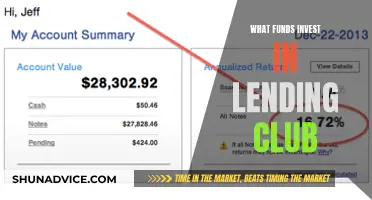
Index funds are a type of investment vehicle aiming to match the returns of a specific market index. They are a low-cost, easy way to build wealth and are popular with retirement investors. An index fund is a group of stocks that aims to mirror the performance of an existing stock market index, such as the Standard & Poor's 500 index. Index funds are passively managed, meaning that investing decisions are almost always based solely on trying to match the index. There are many different indexes to choose from that reach a wide variety of sectors and markets.
| Characteristics | Values |
|---|---|
| Investment type | Index funds |
| Investment fund type | Mutual fund or exchange-traded fund (ETF) |
| Investment fund basis | A preset basket of stocks, or index |
| Investment fund management | Passive, without active management |
| Investment fund performance | Matches the performance of the underlying index |
| Investment fund costs | Low expense ratio |
| Investment fund diversification | High |
| Investment fund risk | Low |
What You'll Learn

Choose a platform and open an account
You can purchase an index fund directly from a mutual fund company or a brokerage. The same goes for exchange-traded funds (ETFs). These are like mini mutual funds that trade like stocks throughout the day.
When choosing where to buy an index fund, consider the following:
- Fund selection: Do you want to purchase index funds from various fund families? The big mutual fund companies carry some of their competitors' funds, but the selection may be more limited than what's available from a discount broker.
- Convenience: Find a single provider who can accommodate all your needs. For example, if you're just going to invest in mutual funds (or even a mix of funds and stocks), a mutual fund company may be able to serve as your investment hub. But if you require sophisticated stock research and screening tools, a discount broker that also sells the index funds you want may be better.
- Trading costs: If the commission or transaction fee isn't waived, consider how much a broker or fund company charges to buy or sell the index fund. Mutual fund commissions are higher than stock trading ones (about $20 or more), while stock and ETF trades are usually less than $10.
- Impact investing: Do they offer funds that target companies with a focus on environmental or social justice causes?
- Commission-free options: Do they offer no-transaction-fee mutual funds or commission-free ETFs?
In addition, you'll need to open an investment account. A brokerage account, individual retirement account (IRA) or Roth IRA will all work.
Factors to Consider When Choosing a Platform
- Fund selection: Does the platform offer a wide range of index funds, including those that track different indexes and cover different asset classes, industries, and geographies?
- Costs and fees: What are the trading fees and expense ratios for the index funds offered on the platform? Are there any account maintenance fees or other charges?
- Convenience: Does the platform offer a user-friendly interface and mobile app? Can you easily access the information and tools you need to research and analyse index funds?
- Customer support: Is there a dedicated team to provide assistance if you have any questions or issues?
- Security: How does the platform protect your personal and financial information? What measures are in place to ensure the safety of your investments?
- Reviews: What do other users have to say about their experience with the platform? Are there any common issues or concerns raised in reviews?
Remember to compare the features and fees of different platforms before making your decision. It's also essential to consider your investment goals, risk tolerance, and the level of involvement you want to have in managing your investments when choosing a platform and opening an account.
Funding Your Chase You Invest Account: Easy Steps to Follow
You may want to see also

Select an index fund with low costs
Index funds are a passive investment strategy that tracks a market index, such as the S&P 500. They are designed to reflect the performance of a particular index, so their returns should closely mirror that of the index.
- Expense ratio: This is the cost that the fund manager charges annually to manage the fund, expressed as a percentage of your investment in the fund. It is one of the main costs of an index fund and can eat into your investment returns over time. Look for funds with low expense ratios, as even small differences in percentages can make a significant impact on your long-term returns.
- Sales load: If you're investing in mutual funds, check if the fund manager charges a sales load or commission. This expense can add up, especially for index funds, so it's generally advisable to avoid funds with sales loads. ETFs, on the other hand, typically do not charge sales loads.
- Account and investment minimums: Some funds have minimum investment requirements, which can range from nothing to a few thousand dollars. Additionally, consider the brokerage account minimums, as some brokers may charge higher fees for lower balances.
- Transparency and diversification: Look for funds that are transparent about their investment strategy and offer a diverse range of holdings across different sectors, company sizes, and geographies. Diversification helps to reduce risk and provide a more stable investment portfolio.
- Turnover: Choose funds with low portfolio turnover, as frequent buying and selling of securities within the fund can generate higher transaction costs and capital gains taxes.
- Fund size: Larger funds tend to have lower fees, as they benefit from economies of scale.
- Fund family and convenience: Consider investing in funds from different fund families to diversify your holdings. Additionally, look for a single provider that can accommodate all your investment needs, including stocks, mutual funds, and ETFs.
Remember that while costs are an important consideration when selecting an index fund, it's also crucial to ensure that the fund aligns with your investment objectives, risk tolerance, and time horizon. Conduct thorough research and compare multiple funds before making your final decision.
T. Rowe Price Funds: Cruise Investment Options Explored
You may want to see also

Invest through a brokerage or directly with a fund provider
Investing in index funds through a brokerage or directly with a fund provider can offer lower fees. Here are the steps to follow:
Have a clear goal for your index funds:
Know what you want to achieve with your money. If you're seeking quick, high returns and are willing to take on more risk, index funds may not be the best option. However, if you're looking for slow, steady growth over time, particularly for retirement, index funds can be a great choice.
Research index funds:
When choosing an index fund, consider factors such as company size and capitalization (small-, mid-, or large-cap indexes), geography, business sector or industry, asset type, and market opportunities. You may only need to invest in one broad stock market index, as recommended by Warren Buffett, or you can customize your portfolio by adding more specific funds.
Choose your index funds:
When selecting an index fund, cost is a crucial factor. Index funds are cheap to run because they are automated to follow the shifts in value in an index. However, don't assume that all index funds are equally cheap; some may have higher management costs than others, so be sure to compare fees.
Decide where to buy your index funds:
You can purchase index funds directly from a mutual fund company or a brokerage. If you choose to buy through a brokerage, consider factors such as fund selection, convenience, trading costs, impact investing, and commission-free options.
Open an investment account:
To purchase shares of an index fund, you'll need to open an investment account. This could be a brokerage account, an individual retirement account (IRA), or a Roth IRA.
Monitor your index funds:
Even though index funds are passively managed, it's important to keep an eye on their performance. Make sure your index fund is mirroring the performance of the underlying index. Also, be mindful of fees; if costs start to stack up, you may want to reconsider your fund choice.
Index funds are a popular investment choice due to their low costs, ease of use, and returns that often beat actively managed accounts. They are a great option for those seeking a passive investment strategy with slow, steady growth over time.
Maximizing Scholarship Funds: Investment Strategies for Students
You may want to see also

Buy shares
Once you've chosen an index fund, you can buy shares in that fund. You can do this by opening a brokerage account that allows you to buy and sell shares of the index fund that interests you. Index funds come in both exchange-traded fund (ETF) and mutual fund forms. Alternatively, you can open an account directly with a mutual fund company that offers an index fund you're interested in.
When deciding where to open an account, consider the costs and features of each option. Some brokers charge extra for their customers to buy index fund shares, making it cheaper to go directly through the index fund company to open a fund account. However, many investors prefer to hold all their investments in a single brokerage account. Plus, many brokers allow customers to buy fractional shares of index funds in ETF form. If you plan to invest in several index funds offered by various fund managers, the brokerage option could be the best way to combine all your investments under a single account.
You can also buy individual stocks of companies in the S&P 500, but this is generally considered riskier than buying an S&P 500 index fund or ETF.
How to buy shares
Once you have a brokerage account, you can buy shares of the index funds you've settled on. Generally, you'll search for or type in the ticker symbol of the fund you want to purchase and the dollar amount you want to invest.
You'll need to buy enough to reach the fund's investment minimum, but after that, you can typically buy fractional shares going forward. The site may ask for your preference regarding dividends—whether they should be used to purchase additional fund shares or deposited into your account as cash.
If you're investing for the long term, most experts recommend reinvesting your dividends because historically, dividends have been responsible for substantial investment growth.
Set up a purchase plan
Investing is typically an ongoing practice, so you'll need to think about your plan for buying index funds over time. Financial advisors often recommend dollar-cost averaging—the practice of putting a certain amount of money into your investments at set intervals.
To make this happen, set up automatic investments that happen on a schedule (such as once a month or every payday) with your brokerage. This ensures that you'll continue to invest regularly.
Things to consider when buying shares
- Expense ratio: The expense ratio is the cost to administer the fund each year. When comparing index funds, this can be a big deciding factor.
- Other fees: You can generally avoid trading fees on index funds at most major brokerages, but be sure to look out for loads, or special fees charged by certain mutual funds when you buy or sell them.
- Investment minimums: If you don't have the cash to meet the minimum investment required, you can cross that fund off your list. If you really want to buy into that particular index, look for the ETF version of that fund, which will typically have no minimum beyond the price of one share.
Index Funds: Where to Start and What to Know
You may want to see also

Monitor and adjust as needed
Index funds are typically long-term investments, but it's still important to review your portfolio periodically to ensure it aligns with your financial goals. Here are some things to keep in mind when monitoring and adjusting your index fund investments:
- Performance and Rebalancing: Regularly review the performance of your index funds and consider rebalancing your portfolio if certain funds are over or underweight. Diversification is an important aspect of risk management, so ensure your investments are spread across different asset classes, sectors, and geographic regions.
- Fees and Expenses: Keep an eye on the fees and expenses associated with your index funds, such as expense ratios, management fees, and transaction costs. These can eat into your returns over time, so consider comparing costs across different funds and brokers.
- Market Conditions: Stay informed about market trends and economic conditions that may impact your index fund investments. Be prepared for market volatility and be willing to adjust your investment strategy if necessary.
- Risk Tolerance: As your financial situation changes, your risk tolerance may also change. Periodically evaluate your risk tolerance and make adjustments to your index fund investments accordingly. For example, if you're approaching retirement, you may want to shift towards more conservative investments.
- Tax Implications: Consider the tax implications of buying, holding, and selling index funds. For example, mutual funds may distribute capital gains that are taxable, while ETFs may offer more favourable tax treatment. Consult with a tax professional to understand the tax consequences of your investments.
- New Investment Opportunities: Stay up to date on new investment opportunities and trends in the market. There may be new index funds or other investment vehicles that better align with your financial goals.
- Seek Professional Advice: Consider consulting with a financial advisor or investment professional to help you monitor and adjust your index fund investments. They can provide guidance and recommendations based on your financial goals, risk tolerance, and market conditions.
The Social Security Trust Fund: Where is it Invested?
You may want to see also
Frequently asked questions
Index funds are a type of investment fund – either a mutual fund or an exchange-traded fund (ETF) – that is based on a preset basket of stocks, or index. Fund managers aim to replicate the index without active management. These funds track popular indexes, which are often referenced in financial news as indicators of overall market performance, giving investors insights into the performance of stocks as a whole.
Index funds are popular with investors because they promise ownership of a wide variety of stocks, greater diversification and lower risk – usually at a low cost. That’s why many investors, especially beginners, find index funds to be superior investments to individual stocks.
When thinking about what index to invest in, consider factors such as your risk tolerance, budget, and investment goals. You should also research the differences between each fund offering within a broad index, including fees and portfolio construction.
You can buy an index fund directly through an index-fund provider like Vanguard or Fidelity. You can also invest in index funds through other brokerage accounts and certain investment apps.
Yes, index funds are often good choices for beginners because of their simplicity, low cost, and diversification. The specific index fund makes a difference though, as some are more geared toward beginners than others.







